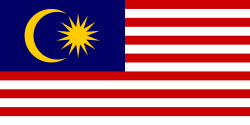This article needs additional citations for verification .(August 2021) |
| Malaysia at the SEA Games | |
|---|---|
 | |
| IOC code | MAS |
| NOC | Olympic Council of Malaysia |
| Website | olympic |
| Medals Ranked 3rd |
|
| SEA Games appearances (overview) | |
Malaysia started sending athletes to the SEA Games in 1959 as a founding member of the Southeast Asian Games Federation (SEAGF) alongside Burma (now Myanmar), Kampuchea (now Cambodia), Laos, Thailand, and the Republic of Vietnam (South Vietnam). Later, Malaysia tendered a suggestion to expand the Southeast Asian Peninsula (SEAP) Games Federation by inviting other Southeast Asian countries such as Brunei, Indonesia, and the Philippines. These three new members were officially welcomed into the Federation on 5 February 1977. The 1977 SEA Games in Kuala Lumpur becomes the first games that bear the title Southeast Asian Games. [1]